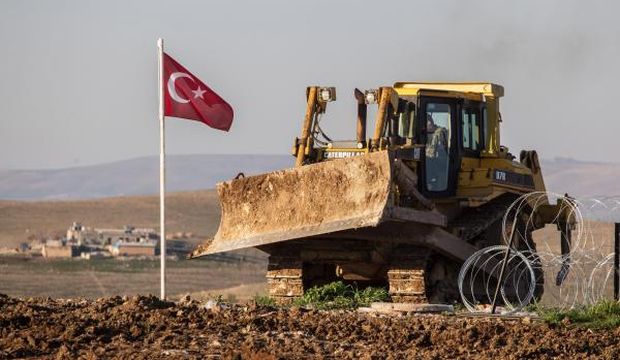
A picture made available on February 23, 2015 shows a digger working near a Turkish flag at the new site for the tomb of Suleyman Shah, near the Esme region in Syria, on February 22, 2015. (EPA/Mursel Coban/Depo Photos)
Beirut, Asharq Al-Awsat—Turkey informed the Islamic State of Iraq and Syria (ISIS) of Saturday’s operation to evacuate 40 of its soldiers in northern Syria and relocate the tomb of a revered Turkish figure, sources told Asharq Al-Awsat on Sunday.
Around 570 Turkish troops and more than 100 armored vehicles rolled into northern Syria on Saturday evening in what was Ankara’s first military incursion into the country since the beginning of its almost four-year conflict.
The troops were part of an operation to rescue 40 Turkish soldiers surrounded by ISIS fighters for months while guarding the tomb of Sulayman Shah, the grandfather of the founder of the Ottoman Empire.
The Turkish military announced on Sunday the tomb was successfully relocated and the soldiers safely brought home. They said no clashes took place during the operation but one soldier was injured in an accident.
Turkish Prime Minister Ahmet Davutoğlu had said at a news conference on Sunday that Turkey had not sought permission or help for the mission, but had informed its allies in the anti-ISIS coalition, as well as the Syrian government and members of the main opposition armed group the Free Syrian Army (FSA).
But a Turkish official, speaking on condition of anonymity, told Asharq Al-Awsat on Sunday that Turkey had informed ISIS of the imminent mission “as it would anyone else,” though the source added this was only done through “indirect channels.”
“Anyone concerned with this matter was informed of it in one way or another,” the source said, adding that Ankara “had been very clear it was willing do everything within its means to avoid any clashes.”
But Tanju Bilgiç, the official spokesman for the Turkish Foreign Ministry, denied the country had been in contact with ISIS.
He also declined to answer questions posed by Asharq Al-Awsat concerning reports of direct cooperation between the extremist group and Ankara and of ISIS militants providing the Turkish soldiers guarding the tomb with food and water during their months-long encirclement of the area.
The tomb, which lies near Lake Assad in northern Syria, is located on an area of land Ankara considers sovereign territory according to a treaty signed in 1921 with France, which was then occupying Syria.
“No one can deny that Sulayman Shah’s tomb, which lies on Syrian lands . . . is actually sovereign Turkish territory according to treaties signed within the context of international law,” Bilgiç told Asharq Al-Awsat.
Ankara had warned last year that ISIS was surrounding the tomb and expressed concern it could be damaged.
Meanwhile, the Syrian government, which Ankara said it had informed of the operation prior to its launch, reacted with anger on Sunday, calling the operation a “flagrant aggression.”
The operation to relocate the tomb was the first incursion by Turkey into Syria since the start of the Syrian conflict.
Ankara has faced much criticism for its reluctance to take action against ISIS on its border, particularly during the group’s assaults on the Syrian border town of Kobani last year, which includes an ethnic Kurdish population.
Along with Qatar in the region others also accuse Turkey of aiding militant Sunni groups such as ISIS and allowing fighters and recruits to cross over into Syria via its borders. The Turkish government has denied the allegations.
